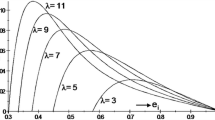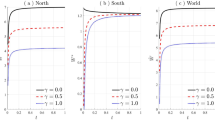Abstract
This paper examines the welfare implications of trade liberalization when governments behave strategically using pollution taxes and tariffs on imports. This competition leads to inefficiencies as each government seeks foreign rent and tries to transfer pollution to the other country. It is shown that banning tariffs leads to a higher level of pollution which decreases total welfare compared to the one obtained under restricted trade. As the rate of transboundary pollution transmission rises, the pollution-shifting motive is reduced and this leads to a too high pollution level. This problem is amplified when tariffs aren't available to governments.
Similar content being viewed by others
References
Barrett, S. (1994). “Strategic Environmental Policy and International Trade.” Journal of Public Economics 54(2), 325–328.
Baumol, W. J. and W. E. Oates. (1988). The Theory of Environmental Policy, Cambridge, UK: Cambridge University Press.
Brander, J. A. (1981). “Intra-Industry Trade in Identical Commodities.” Journal of International Economics 11, 1–14.
Brander, J. A. and P. Krugman. (1983). “A 'Reciprocal Dumping' Model of International Trade.” Journal of International Economics 15, 313–321.
Brander, J. A. and B. Spencer. (1985). “Export Subsidies and International Market Share Rivalry.” Journal of International Economics 18, 83–100.
Buchanan, J. M. (1969). “External Diseconomies, Corrective Taxes and Market Structure.” American Economic Review 59(1), 174–177.
Dean, J. M. (1992). “Trade and the Environment: A Survey of the Literature.” In P. Low (ed.), International Trade and the Environment. The World Bank, Washington, DC, pp. 15–28.
Gibbons, R. (1992). Game Theory for Applied Economists, Princeton University Press, Princeton, NJ. p. 267.
Gordon, R. H. and A. L. Bovenberg. (1996). “Why Capital is so Immobile Internationaly? Possible Explanations and Implications for Capital Income Taxation.” American Economic Review 86, 1057–1075.
Hoel, M. (1997). “Environmental Policy with Endogenous Plant Locations.” Scandinavian Journal of Economics 99, 241–259.
Hudec, R. E. (1996). “GATT Legal Restraints on the Use of Trade Measures against Foreign Environmental Practices.” In J. Bhagwati and R. E. Hudec (eds.), Fair Trade and Harmonization: Prerequisites for Free-trade? Vol. 2, p. 492. Cambridge, MA: The MIT Press.
Jaffe, A. D., S. R. Peterson, P. R. Portney and R. N. Stavins. (1993). “The Effect of Environmental Regulation on International Competitiveness: What the Evidence Tells Us.” Journal of Economic Literature 33(1), 124–140.
Kennedy, P. W. (1994). “Equilibrium Pollution Taxes in Open Economies with Imperfect Competition.” Journal of Environmental Economics and Management 27, 49–63.
Krugman, P. R. and M. Obstfeld. (1994). “International Economics: Theory and Policy.” 3rd edition, New York, NY: HarperCollins College Publishers.
Markusen, J. R., E. R. Morey and N. Olewiler. (1995). “Competition in Regional Environmental Policies when Plant Locations are Endogenous.” Journal of Public Economics 56(1), 55–78.
Rauscher, M. (1994). “On Ecological Dumping.” Oxford Economic Papers 46, 822–840.
Tanguay, G. A. (2001). “Bidding for Polluting Firms: The Race for the Bottom.” Pennsylvania Economic Review 10(1), 14–24.
Tanguay, G. A. and N. Marceau (forthcoming). “Centralized vs. Decentralized Taxation of Mobile Polluting Firms.” Resource and Energy Economics.
Walz, U. and D. Wellisch. (1997). “Is Free Trade in the Interest of Exporting Countries when There is Ecological Dumping.” Journal of Public Economics 66, 275–291.
Author information
Authors and Affiliations
Rights and permissions
About this article
Cite this article
Tanguay, G.A. Strategic Environmental Policies under International Duopolistic Competition. International Tax and Public Finance 8, 793–811 (2001). https://doi.org/10.1023/A:1012899411982
Issue Date:
DOI: https://doi.org/10.1023/A:1012899411982




